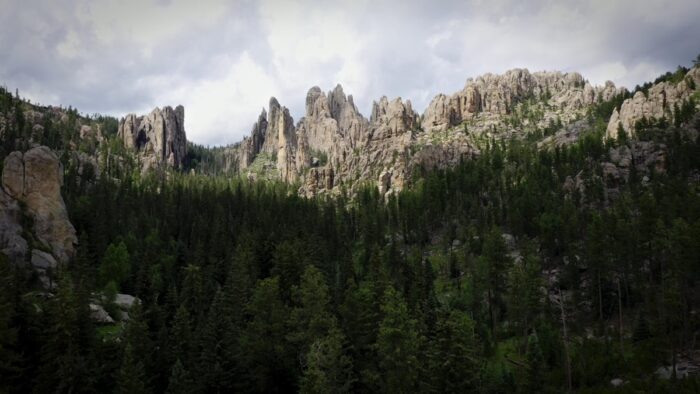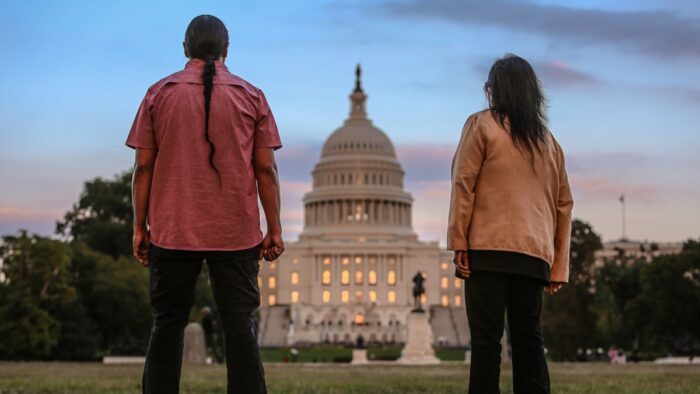Oyate, a 2022 documentary featured at this year’s Twin Cities Film Festival, focuses on the people of Standing Rock as they coalesced behind their common cause: the defense of their land and water from the threat of the Dakota Access Pipeline. With powerful imagery and passionate subjects, Oyate moves from the specifics of the pipeline protests to the general humanitarian concerns of indigenous peoples, educating and inspiring along the way.
It was in 2016 that the people of Standing Rock—for more than a century largely ignored and oppressed—were front-page news. When Energy Transfer Partners’ Dakota Access Pipeline began rerouting beneath the Missouri River and part of Lake Oahe in North Dakota near the Standing Rock Reservation, tribal leaders and members considered the construction a serious potential threat to the region’s water and to their ancient burial grounds and cultural sites.

Their protests—known as the Dakota Access Pipeline Protests and identified with the hashtag #NoDAP—began with a campaign to stop the pipeline called “ReZpect Our Water”. Their camps gradually grew to thousands of people. Conflicts soon escalated to violence: construction workers bulldozed a section of privately owned land; militarized police cleared an encampment and later used water cannons on protesters in freezing weather in 2017. Barack Obama’s administration halted the pipeline’s construction under the Missouri, but Donald Trump’s reversed that decision, and today, despite an ongoing environmental review and litigation, the pipeline is in operation.
Oyate focuses first on this conflict, taking its viewers step by step through the protests through the indigenous voices of activist Phyllis Young, attorney Chase Iron Eyes and his daughter Tokata, hip hop artist Stuart James, and Secretary of the Interior Deb Haaland. Each of them has their own story to tell, focusing on different aspects of the conflict as they have advocated and protested for sovereignty.

Theirs has been a history of systemic oppression defined by broken treaties, land theft, and cultural erasure, one that contextualizes the pipeline protests from a perspective not normally presented in the mainstream media. The pipeline protests—harsh, brutal, worrisome—form the film’s primary storyline, an intersection of capitalist greed, citizen protests, tribal rights, and overt racism, crystallized at a moment in time of cultural upheaval between the Obama and Trump administrations (and later, the Biden).
The latter half of the story told in Oyate follows the film’s subjects as they take their fight beyond the reservation to their state governments, to Washington DC, and eventually even to the United Nations on behalf of indigenous peoples everywhere. Here, Oyate does the necessary work of connecting the pipeline protests to the not-at-all-dissimilar plights faced by indigenous peoples across the world. It may feel a lot for a short documentary to take on, but the connections between the pipeline protests and the injustices of prior centuries are clear and sobering.
The #NoDAPL struggle became an inflection point for human rights and environmental justice and a rallying cry for Indigenous people everywhere. Here is a film that elevates the voices of these indigenous activists, organizers, and politicians. While it may take on a myriad of related subjects—for instance, the 1970s protests at Wounded Knee and the AIM movement, or the ongoing plague of missing and murdered indigenous women—that’s a necessary consequence of the unsolved issues that face native people.
Oyate—meaning people or nation—focuses on the connections between all of these that form the community who have seen their lands ravaged, turned into monuments, water polluted, women murdered, treaties broken, and spirit diminished. Its footage and recounting of the pipeline protests might be its most immediate, pressing concern, but it also does the necessary work of connecting that moment in time, though the eyes of its participants, to a longer and more regrettable history. It’s well worth the time to watch—and to listen to the voices of those who’ve been most directly impacted by the events of our history.




